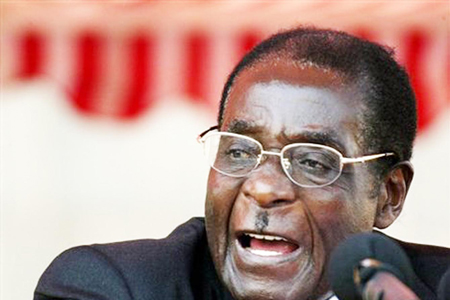
PRESIDENT Robert Mugabe faces the wrath of the people in the next few years because he will not be able fulfill election promises made to suffering Zimbabweans in the run-up to the polls, political analysts have said.
BY CAIPHAS CHIMHETE
He neither has capacity nor the capital to do so, they said. The analysts said the 89-year-old president, might have won the hearts of ordinary people who voted him into power on the July 31 polls, but his impractical populist rhetoric could soon backfire.
In a first since he assumed power over three decades ago, Mugabe recently ordered local authorities to scrap debts they were owed by rate-payers.
He is even toying with the idea of scrapping electricity bills, at a time Zesa is failing to provide regular power to the same ordinary people Mugabe wants to appease.
The debt-ridden power utility is also struggling to service its regional debts.
In the party’s manifesto, Mugabe says he will create 2,265 million jobs across key sectors of the economy and ensure food security. Presently, unemployment tops 85% in the country and few households can afford three full meals per day.
But political analyst, Dumisani Nkomo said Zanu PF’s growth strategy, which is premised on indigenisation, will actually upset the national economy that had stabilised during the four years of inclusive government.
- Chamisa under fire over US$120K donation
- Mavhunga puts DeMbare into Chibuku quarterfinals
- Pension funds bet on Cabora Bassa oilfields
- Councils defy govt fire tender directive
Keep Reading
Under the policy of indigenisation, foreign-owned firms are forced to cede at least 51% of their shareholding to locals, a development that has caused loss of investor confidence and capital flight.
Through this, Zanu PF targets to create value of US$7,3 billion from the indigenisation of 1 138 firms and over US$1,8 billion from the idle value of empowerment assets unlocked from parastatals, mineral rights and claims.
“They [Zanu PF] do not have the capacity and capital to fulfill the election promises,” declared Nkomo. “If they pursue indigenisation, the way they want to do it, it may upset the economy and cause loss of investor confidence and capital flight.”
Another analyst Fambai Ngirande is equally pessimistic that Mugabe will be able to fulfill his election promises.
“One should never take Zanu PF’s election promises at face value,” said Ngirande. “Their legacy of failed promises speaks volumes about their capacity.”
But Mugabe — labelled a dictator that caused the collapse of the country’s economy that was known as the Jewel of Africa when he took over in 1980 — will fight hard to fulfill his promises to rescue his legacy before he retires or dies in office.
He wants people to forget his not-so-pleasing past.
“But we could be witnessing the turning of a new leaf as Mugabe seeks to rescue his legacy,” said Ngirande. “A lot depends on the resurgence of the reformist element in Zanu PF, and the space accorded to steer the new course.”
Nkomo advised Zanu PF to build on the gains of the inclusive government that managed to stabilise the economy, and witnessed marginal growth in a peaceful environment.
There is a possibility that Mugabe will redirect diamond money and other revenue from the shadowy parallel economy into the national fiscus for use in national development so that he achieves his targets.
“Having witnessed Zanu PF adopt a more leftist agenda than the MDC-T, one is tempted to imagine greater dividends for the suffering poor than before,” said Ngirande. “Time will tell.”
Another analyst, who requested anonymity, foresees Mugabe soon facing the wrath of the people through revolts as hardships bite.
Zanu PF may as well be voted out of power in 2018 if it fails to deliver on the promises, as Zimbabweans are becoming more politically-conscious, he said.
“It is not surprising that in a year or two we will have revolts similar to those we witnessed in 1998,” said the analyst. “I see the economic situation worsening in the next few years, if Mugabe fails to engage the international community or continues to pursue his scorched-earth indigenisation policy which drives away investors.”
But Zanu PF spokesperson, Rugare Gumbo yesterday insisted that his party would meet most of the targets spelt out in the manifesto. He said with resources from minerals “awash” in the country and agriculture, nothing would stop Zanu PF.
“We have minerals and agriculture and if we organise ourselves well, we will achieve most of our objectives in the next five years,” said Gumbo. “For the past 10 years, we have been under sanctions but we managed to pull through. Who was financing us? We will do it.”
What zanu pf promised the electorate
The party says it will build 250 000 low-income housing units; 1 250 public houses and 2 500 shell factories; flea and vendor market stands would be created in the next five years.
Surprisingly, it is the same Zanu PF administration that demolished people’s homes in 2005 under Operation Murambatsvina, rendering 700 000 people homeless. Up to now, it has never been able to offer them alternative accommodation.
It only managed to build a few match-box houses for its supporters under Operation Garikai/Hlalani Kuhle, leaving the rest in the cold. Zanu PF also claims that 310 clinics and 300 schools will be built and a new parliament complex will be constructed in Mt Hampden in Harare, all this within the next five years.
The party promises an average GDP growth rate of 9% by 2018, up from the current 4,4%.









